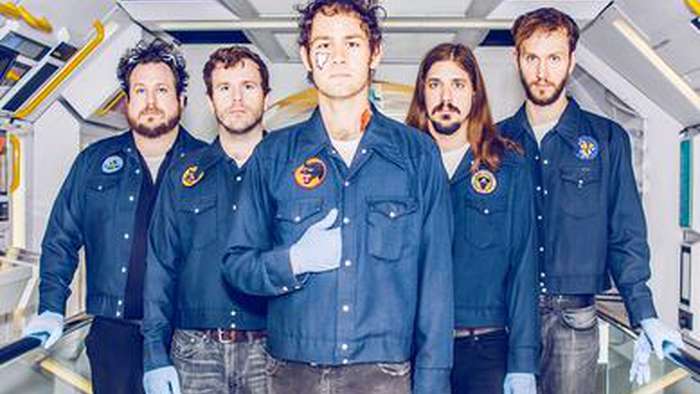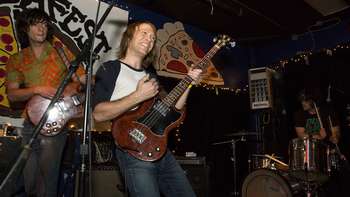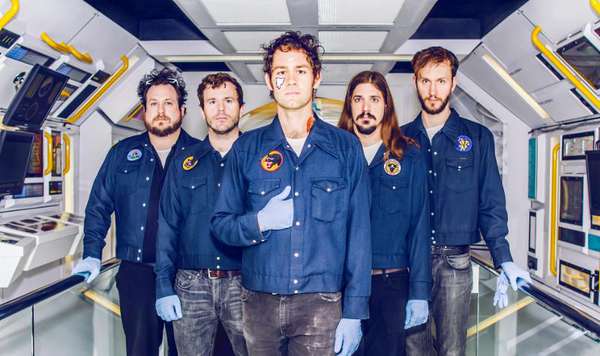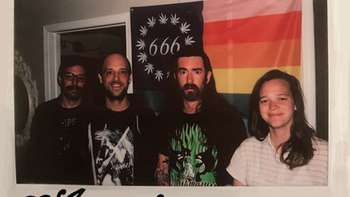The Treasure Fleet play by their own rules. Sure, there are members of familiar bands like The Arrivals, The Lawrence Arms, and Smoking Popes, but it’s a truly unique band that takes psychedelic, reverb-drench rock and strips to a concise core. It’s trippy and explorative, but before you get bored midway through the third freakout.
Explorative is a key takeaway in that description, as their early 2015 release The Sun Machine (Recess Records) wasn’t just an album, but a film as well. The get the full story of how it came to be and the marketing challenges of such an undertaking, SPB sent ringleader Isaac Thotz a series of emails to discuss the project.
One year later, here’s the full story on how The Sun King was made and how to see its various media interpretations.
The Treasure Fleet is:
• Neil Hennessy - bass/vocals
• Mike Oberlin - drums/percussion
• Jon Olson guitar/marimba/percussion
• Preston Bryant - guitars/synths/percussion/vocals
• Dave Merriman keys
• Eli Caterer - guitars
• Isaac Thotz vocals/guitars/synths
The Making of The Sun King:
• Fall 2012 – arrangement
• Winter/spring 2013 – tracking
• March 2013 – Started filming
• 2013-2014 – mixing of record (throughout)
• October 2013 – Completed filming
• Fall 2014 – Completed film editing
• Fall 2013 – Film premiere
• February 2015 – Album release
Scene Point Blank: Who is the membership now? Is it a steady band or rotating cast?
Isaac Thotz: About the same as always. The line-up for Treasure Fleet has always been a fluid thing. I moved to L.A. from Chicago a little over a year ago, so that will complicate things even more. I’ve said the same thing for some time, which is that Neil, Mike, and I have played every Treasure Fleet show and played on every record. That still holds true, so that’s a core. What the future may hold, I have no idea.
Scene Point Blank: : You relocated from Chicago to LA. Where are the other players based right now?
Isaac Thotz: I live in Los Angeles. Neil lives in Los Angeles as well. Mike lives in Chicago. Preston lives in Oakland. Everybody else who’s ever played in Treasure Fleet lives in Chicago.
Scene Point Blank: What’s the story of how The Sun Machine came to be?
Isaac Thotz: So there’s the movie and the record, (and the book), and every step of how each one of those came to be is pretty insane. I’ll try to make this quick.
 Preston Bryant helped make the record. We set out to just make some 7” recordings. Preston produced, engineered, and gave a ton of feedback in writing, and we arranged the songs with him. He lived in my attic for like five months while we were doing this. Preston and I thought the recordings were turning out really great, but the songs were sort of conceptually all over the place.
Preston Bryant helped make the record. We set out to just make some 7” recordings. Preston produced, engineered, and gave a ton of feedback in writing, and we arranged the songs with him. He lived in my attic for like five months while we were doing this. Preston and I thought the recordings were turning out really great, but the songs were sort of conceptually all over the place.
I got this idea of how to try to tie them all together with a storyline and pitched the idea to Neil and Mike to make a concept record. I was on a classic sci-fi TV and movie binge: Twilight Zone and ‘70s Italian Spaghetti sci-fi, so sci-fi is sort of where the story went. I rewrote some lyrics to fit the story and wrote a couple songs to glue it all together.
So that’s how the record originated.
Then after tracking was totally done, Preston and I were having lunch one day and he started telling me how he was an expert in the Texas Chainsaw Massacre. He ran a premiere fan page on the early internet: he knew tons about it and its making, had interviewed the director, etc. He was telling me how ambitious it was to pull off, and made on shoestring. By the end of the conversation, I’d decided to make the concept album into a music video. Neil encouraged me to write an outline to flesh out some of the ideas in the storyline, so I sat down and wrote the book.
Scene Point Blank: How long had you been working out the idea and challenges of production in your head?
Isaac Thotz: The whole thing took three years to complete. But planning: hardly at all. I made everything up as we went along, and we just crossed the bridges as we came to them. Lots of frustration, lots of dead ends. But I’m a fast learner.
Scene Point Blank: Who wrote the songs? Was it just you or did you have help?
Isaac Thotz: The songs were all things that I had been sitting on. Mike, Neil, Preston, and I arranged the songs. Preston made a lot of the songs come alive in the recording process with additional guitars and synths. Eli, Little Dave, and Jon all played on the record. There’s the improvised synth composition before “Sirens of Titan.” Preston laid down the initial synth and I just twiddled on top of it. So that’s more him than me.
Scene Point Blank: What’s up with the film? Is it available to the public, screening, etc.?
Isaac Thotz: It premiered at an independent film festival in London called Raindance. It was extremely rewarding to see and hear it in a real theater setting and I was flattered that they showed it at all. It also showed in Minneapolis around the same time.
I don’t know if people who aren’t in independent film are aware—I certainly wasn’t aware before The Sun Machine—but it’s actually quite a bit of work and rather expensive to apply to film festivals. And most of the time you’re rejected. The big reasons people want to go to a film festival is for connections in the film industry and, especially, for distribution. None of that was really important to me, so once I saw the film somewhere other than on my computer, I said “good enough.” If someone ever asks to show it in a theater again...of course I’ll agree. But for now it resides on the internet at thetreasurefleet.com. You can watch it there and you can also read the novel at that site.
Scene Point Blank: What is your background in literature and film?
Isaac Thotz: I adore many works of both literature and film. I was trained at the university as a mathematician, and later as a philosopher.
Scene Point Blank: How does the live show work for integrating he Sun Machine into the overall set? Do you intersperse these songs with your existing catalog or as a standalone affair? Do you think it translates well to a live setting?
Isaac Thotz: We did one short tour after The Sun Machine came out and we did intersperse the songs.
The first night we played four or five songs from The Sun Machine. I thought we nailed them but, I felt like people found them confusing; They’re pretty involved compositionally and there’s this sort of overarching storytelling that’s happening, but without the visual reinforcement. So we kept trimming songs off the new record throughout the tour. Based on that, I don’t think it translates well to a live setting. I think if people knew the movie, maybe they’d be more interested in just the songs. But I don’t know.
Scene Point Blank: As an independent musician, what is your approach to such a big concept? Did you seek out friends, professionals?
Isaac Thotz: Friends—and some friends who are also professionals. People I like and trust, and people who I know I can do right by. That is, I want to be assured that someone will be able to get something out of an experience to the extent that they put in. And then mostly, I just do things myself. That’s my first instinct.
With the film, I did most of the shooting, with a tremendous amount of help from my wife, Sue, who shot a lot and is also in the film. I did the editing myself. I directed the film. I paid for everything myself. Katie Hovland is a great photographer, she helped me get started in developing an eye to shoot. Matt Allison is another pro who’s been exceedingly generous both in offering help with mixing and in teaching me. Mike and Neil, of course acted and performed musically, Preston too. Then Todd C. from Recess, and Eloy Lugo from Grandstand helped enormously once the thing was made. But I have no real approach to production. An approach would probably be a good idea one of these days.
Scene Point Blank: How was the response so far? Was it what you expected or did most people get it?
Isaac Thotz: Well, it’s only been completed for less than a year, so I’m not sure. It took three years to make, so that doesn’t feel like a very long time for it to be out. Did it make a huge cultural splash when it came out? Anyone who’s reading this knows that it didn’t. A lot of people who make livings as critics or who use their taste in art and music for a living thought it was great and went on the record saying so, so that’s rewarding to me.
I’ve realized something very recently about the way I look at this issue and that it differs from the way some people look at it. In the Arrivals, Little Dave and I always took the long view on anything we made. We’d be like, “Okay so people may not get what we’re doing now, but in ten years, maybe?” Little Dave had a pretty amazing saying that went something like: “This one’s for the annals, not for the animals.”
I think the idea is that you just make something that you think is quality without worrying about the particular taste fad of the times. That’s a risky bet if what you’re trying to do is sell something but that’s not my motivation. I think that anybody who wants to get it...it’s easy to get.
Scene Point Blank: As a member of the punk community, do you find that Treasure Fleet is a project that people understand or is there confusion at your sound because much of the scene is used to a direct, aggressive tone?
Isaac Thotz: Well, it’d be hard to find too much agreement pinning down what the punk scene is, or likes. The punk scene is a microcosm of any art scene. It’s very diverse and always changing. But again, I don’t worry about what other people like at any particular point and time. I’m just trying to use my taste to make something that I like and then put it out there in case somebody else might also like it or be moved by it or be inspired by it at some point in the future. I’m definitely not worried about trying to match any particular existing aesthetic.
Scene Point Blank: Is film a one-off direct for the band or it is something that Treasure Fleet will continue to pursue?
Isaac Thotz: I don’t know what Treasure Fleet will get up to. But I hope I will make more videos in the future. I really loved the process.
Do you define the band as a side project or as a full-time band? What is up with the Arrivals these days?
It’s a band. So is the Arrivals. I’m full-time being creative, but I can only get together with certain groups of people so often and the distance makes that a challenge.









